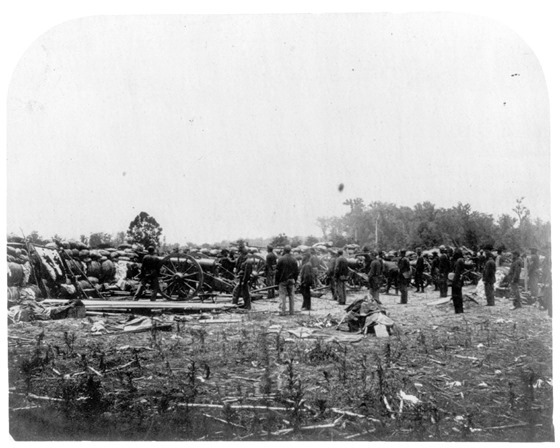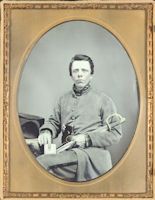
Captain Albert G. Mack’s Union soldiers with cannons behind breastworks.
photographic print : albumen silver.
Image of War Volume IV by William C. Davis, p. 75: The 18th New York Artillery used cotton bales, shielding their 20-pounder Parrott rifles.
Library of Congress image.
__________
 Note – This image has been digitally adjusted for one or more of the following:
Note – This image has been digitally adjusted for one or more of the following:
- fade correction,
- color, contrast, and/or saturation enhancement
- selected spot removal.
3rd. Day passed much as usual. Played a little chess with Thede and Johnny. Called on the Capt. Found him about the same. Stomach much out of order and some fever. Called for bread at Widow Vickery’s. Permission to borrow some books.
Before Vicksburg, Wednesday, June 3. Nothing of importance until about 3 P. M. when the enemy opened with artillery all along the line, which soon brought the cannoneers to their post, and rapid firing of twenty minutes convinced them that they had better quit. The shells flew very thick for a few minutes. One 24-pounder dropped into the second piece’s bastion, taking out the eye of Fred Baker, the first man wounded by rebs. Received mail.
June 1 and 2—Nothing new.
June 3—Saw my brother Morris several times.
June 3. During the early part of this day, or even the whole morning, all was quiet at Port Hudson and on the Mississippi. During early part of the afternoon the steamer General Sterling Price arrived from Vicksburg; fighting still going on in that quarter; at five thirty the steamer Price and Gen. Banks went up the river. Heard heavy cannonading going on at Port Hudson, between the two contending armies, and I am not aware as yet who’s who, or who is getting the best of it; at six thirty P. M. ram Switzerland came down the river, and anchored, communicating with us. She returned up the river, again. Mortar vessels below, commenced about nine o’clock, and continued firing during the watch, three of the enemy’s guns at the same time firing inland upon our army in rear of Port Hudson, and continuing their firing until a late hour; at eleven P. M.; quick discharges of musketry heard in rear of Port Hudson, and two rockets seen sent up from that vicinity. It is reported as being true, that Banks has lost, up to the present time, from his late engagements with the enemy, some two thousand men in killed and wounded. Of one negro regiment, numbering a thousand men, when they charged the rebel works on the morning of the 27th of May last, six hundred remain to tell the fate of their comrades. This speaks well for their bravery.
July 3d, 1863.
We are encamped six miles from Haines Bluff, on a ridge of ground, in a perfect wilderness. I have hardly seen level ground enough, in this State, for a regiment to camp on. I find blackberries in abundance, and, therefore, am content. They have formed a large share of my diet, and have been both food and medicine. Scurvy and diarrhea have entirely disappeared. That which we most need and cannot get is pure water. The streams have all run dry, and unless it rains soon, every spring within reach of us will fail. Water is now so scarce every regiment except the Seventeenth has placed a guard over its own spring, and will not allow others to use it. If we stay here long, we will be compelled to dig wells.
We are now twelve miles from Vicksburg and eight miles from the Big Black. I can still hear the thunder of artillery, morning and eve, at the former place. If Grant celebrates the Fourth inside of Vicksburg, as report says he intends to do, he must do something decisive soon. He may be doing that very thing this minute. When I began writing, his cannon kept up a continual roar. It has almost ceased. Perhaps he is now storming their works.
Our men are still throwing up fortifications. The whole country for fifteen miles around Vicksburg is little less than a fortification. The inhabitants around here did not run away at our approach. Most of them are intensely loyal just now. The reports of want and destitution with which the papers are filled, and which I doubted, are true. Many families draw all their supplies from our Quartermaster. Soon all must do so.
June 3 — All is quiet this morning. 3 o’clock p.m. — Gun boats are now shelling us. Charley Graves was wounded a few minutes ago by one of those shells. His leg will have to be amputated.
4 o’clock p.m. — Heavy cannonading at this hour on the back line — musketry can also be heard. It is reported that Johnson will attack the enemy on Friday the 5th.
8 o’clock p.m. — We left our trenches and moved up the line to the left, to support a weak point near the Hauls Ferry road. Heavy cannonading is now going on at that point.
9 o’clock p.m. — The gunboats have now come up and are now shelling the bottoms in the direction of town rapidly. They continued an hour, then calmed down and we got to sleep a little. W.R.C.
by John Beauchamp Jones
JUNE 3D.—Gen. Lee communicates to the department to-day his views of the Montgomery letter to Gen. Forrest, a copy of which was sent him by Governor Vance. He terms it “diabolical.” It seems to have been an official letter, superscribed by “C. Marshall, Major and A. A. G.” Gen. Lee suggests that it be not published, but that copies be sent to all our generals.
Hon. R. M. T. Hunter urges the Secretary, in a lengthy letter, to send a cavalry brigade into Essex and the adjacent counties, to protect the inhabitants from the incursions of the “Yankees.” He says a government agent has established a commissary department within six miles of his house, and it will be sure to be destroyed if no force be sent there adequate to its defense. He says, moreover, if our troops are to operate only in the great armies facing the enemy, a few hostile regiments of horse may easily devastate the country without molestation.
Gov. Vance writes a most indignant reply to a letter which, it seems, had been addressed to him by the Assistant Secretary of War, Judge Campbell, in which there was an intimation that the judicial department of the State government “lent itself” to the work of protecting deserters, etc. This the Governor repels as untrue, and says the judges shall have his protection. That North Carolina has been wronged by calumnious imputations, and many in the army and elsewhere made to believe she was not putting forth all her energies in the work of independence. He declares that North Carolina furnished more than half the killed and wounded in the two great battles on the Rappahannock, in December and May last.
By the Northern papers we see the President of the United States, his wife, and his cabinet are amusing themselves at the White House with Spiritualism.
June 3rd, 1863. —I have been sick, dear Diary. I have not been able even to think at times and I am a fright. The fever made my hair drop out and I am wearing a black silk cap, which makes me look like the picture of the Jesuits.
So much has happened since I wrote here last. I miss Susie and Aunt Nancy and I am so sorry for Aunt Margaret. The whole country misses Uncle Daniel for he was such a fine officer, so splendidly equipped to command men.
My pupils have all gone away. I did not know when they went but the father died and the boys are scattered among their relatives. I hope they can go to school for they were actually learning a little.
Father says I can resume the book-keeping when I am well again. The call for troops made it necessary for Mr. Ansell and Mr. Edmondson, the brother-in-law, to enlist or leave the country. Rather than return to England they took the oath of allegiance to the Confederate Government and have joined the Gamble Artillery; that is, they expect to be in Colonel Gamble’s command. Mrs. Ansell will stay on in the house provided for the mill manager.
Dr. English has written to Father in regard to a wounded soldier he is bringing with him from a hospital in Virginia. The doctor went on to see his nephew, who was wounded in a skirmish near Harper’s Ferry, but when he reached the hospital his nephew had been dead two weeks. He found there a young Virginian, whose injuries were severe and painful; the surgeons in attendance said he was shot through both lungs, the bullet making what they term “a clean wound,” entering on one side cutting its way through and leaving the body in a direct line. They think if he could get to some quiet place, where his wound could receive close medical treatment he might recover. Of course Father wants him to come here.
We always keep Charley when the doctor goes and he is with us now. He is like a little brother to me and Father and Mother are more like parents to him than his own father. The doctor is a scientific man, not an M. D., but a Ph.D., and a long list of other letters, which mean so much to him. He is so wrapped up in his researches that he does not find his own young son very interesting. Charley is happy here, however, and we love the poor motherless boy.
Wednesday, 3d.—Reported Johnston has been fighting Yanks in the rear. Last night moved over hill to safer place, but very near works.
 Note – This image has been digitally adjusted for one or more of the following:
Note – This image has been digitally adjusted for one or more of the following:










